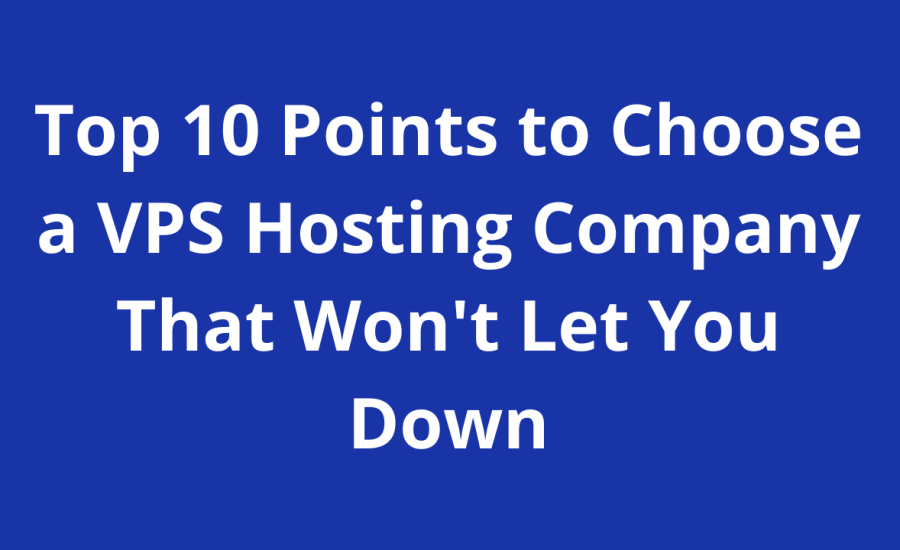Choosing the right VPS hosting company is crucial for your website’s success. With so many options available, it can be challenging to know which provider will deliver the best performance, reliability, and customer support. In this blog, we’ll explore the top 10 points to consider when selecting a VPS hosting company that won’t let you down. By focusing on these key factors, you can ensure that your hosting solution meets your needs and supports your online growth.

Table of Contents
1. Performance and Reliability
One of the most critical factors in choosing a VPS hosting company is the performance and reliability of their servers. You need a provider that guarantees high uptime and fast loading times. Look for companies that offer SSD storage, high RAM, and powerful CPUs. Check their uptime guarantee – a reliable provider should offer at least 99.9% uptime. Read reviews and testimonials to gauge the performance history and reliability of the company.
2. Scalability
Your hosting needs may change as your website grows. A good VPS hosting company should offer scalable solutions that allow you to upgrade your resources easily. Whether you need more CPU power, additional RAM, or increased storage, the provider should offer flexible plans that can grow with your business. Scalability ensures that your hosting solution remains efficient and cost-effective over time.
3. Security Features
Security is paramount when choosing a VPS hosting company. Ensure that the provider offers robust security features such as DDoS protection, firewalls, regular security updates, and automated backups. Additionally, look for companies that provide SSL certificates and other encryption methods to protect your data. A secure hosting environment is essential to safeguard your website and customer information.
4. Customer Support
Quality customer support is essential in a VPS hosting company. Look for providers that offer 24/7 support through various channels, including live chat, email, and phone. Responsive and knowledgeable support teams can quickly resolve issues, minimizing downtime and ensuring smooth operation. Check customer reviews and testimonials to see how the company handles support inquiries and issues.
5. Pricing and Value
While cost shouldn’t be the only factor, it’s important to choose a VPS hosting company that offers competitive pricing and good value for money. Compare different providers to see what features and resources they offer at various price points. Look for transparent pricing structures with no hidden fees. Consider the overall value, including performance, security, and support, to ensure you’re getting the best deal. You can also opt for free web hosting.
6. Control Panel and Ease of Use
The control panel is where you’ll manage your VPS hosting account. A good VPS hosting company should provide an intuitive and user-friendly control panel, such as cPanel or Plesk. These control panels simplify server management tasks, making it easier for you to configure settings, manage files, and install applications. A straightforward control panel can save you time and reduce the complexity of managing your server.
7. Operating System Options
Different websites and applications may require specific operating systems. A flexible VPS hosting company should offer a variety of operating system options, including popular choices like Linux and Windows. This flexibility allows you to choose the best environment for your website or application, ensuring compatibility and optimal performance.
8. Data Center Locations
The location of data centers can impact the performance and speed of your website. A reputable VPS hosting company should have multiple data centers in strategic locations worldwide. Choose a provider with data centers close to your target audience to reduce latency and improve loading times. Additionally, having multiple data centers ensures redundancy, enhancing reliability and uptime.
9. Managed vs. Unmanaged VPS
When selecting a VPS hosting company, decide whether you need a managed or unmanaged VPS. Managed VPS hosting includes technical support and server management, making it ideal for those without extensive technical knowledge. Unmanaged VPS hosting, on the other hand, requires you to handle all server management tasks but offers more control and is usually cheaper. Choose a provider that offers the level of support and control you need.
10. Additional Features and Add-ons
Lastly, consider the additional features and add-ons offered by the VPS hosting company. These can include one-click installations, free migration services, automated backups, and enhanced security features. Additional features can add significant value to your hosting plan, making it easier to manage and enhance your website. Ensure that the provider offers the tools and features that align with your needs.
Conclusion
Choosing the right VPS hosting company is essential for the success of your website. By considering factors such as performance, scalability, security, customer support, pricing, and additional features, you can select a provider that meets your needs and supports your online growth. A reliable VPS hosting company will provide a robust, secure, and scalable hosting solution that ensures your website runs smoothly and efficiently.
FAQs
1. What is a VPS hosting company?
A VPS hosting company provides Virtual Private Server (VPS) hosting services, offering dedicated resources within a virtualized environment on a physical server. It combines the benefits of shared hosting and dedicated hosting, providing better performance, security, and control.
2. How does VPS hosting differ from shared hosting?
VPS hosting offers dedicated resources and better performance compared to shared hosting, where multiple websites share the same server resources. A VPS hosting company provides more control, scalability, and security, making it suitable for growing websites and businesses.
3. Why is uptime important in a VPS hosting company?
Uptime refers to the amount of time a server is operational and accessible. High uptime ensures that your website remains online and accessible to users. A reputable VPS hosting company should offer at least 99.9% uptime to minimize downtime and ensure a seamless user experience.
4. What are the benefits of managed VPS hosting?
Managed VPS hosting includes technical support and server management, making it ideal for those without extensive technical knowledge. A VPS hosting company offering managed VPS hosting handles tasks such as updates, security, and backups, allowing you to focus on your website and business.
5. How can data center locations impact website performance?
The location of data centers can affect the speed and performance of your website. A VPS hosting company with data centers close to your target audience can reduce latency and improve loading times. Multiple data centers also provide redundancy, enhancing reliability and uptime.
Bonus Content: Tips for Optimizing Your VPS Hosting
- Enable Caching: Use caching plugins to speed up your website by storing static copies of your pages.
- Optimize Images: Compress images to reduce load times without compromising quality.
- Regular Updates: Keep your server software, applications, and plugins up to date to ensure optimal performance and security.
- Monitor Performance: Regularly monitor your server’s performance and make necessary adjustments to maintain fast loading times.
- Implement Security Measures: Set up firewalls, use strong passwords, and consider security plugins to protect your server from threats.
By following these tips and leveraging the VPS hosting company features, you can ensure your site runs smoothly, providing a better experience.
